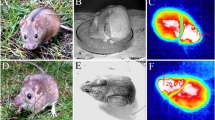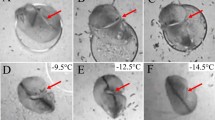Abstract
THE reaction of an animal to cold stress varies with the species and with the degree of stress imposed on the animal. Shields, Platner and Neubeiser1 have shown that the albino laboratory rat reacts to a cold stress (4.0° ± 2° C for 20 days) with a marked decrease in serum albumin. They regarded catabolism of albumin as the prime factor responsible for its fall in serum.
This is a preview of subscription content, access via your institution
Access options
Subscribe to this journal
Receive 51 print issues and online access
$199.00 per year
only $3.90 per issue
Buy this article
- Purchase on SpringerLink
- Instant access to the full article PDF.
USD 39.95
Prices may be subject to local taxes which are calculated during checkout
Similar content being viewed by others
References
Shields, J. L., Platner, W. S., and Neubeiser, R. E., Amer. J. Physiol., 199, 942 (1960).
Moore, D. H., J. Biol. Chem., 161, 21 (1945).
Baker, D. G., and Sellers, E. A., Canad. J. Biochem. Physiol., 35, 631 (1957).
Trapani, I. L., Fed. Proc., 19, Suppl. No. 5, 109 (1960).
Author information
Authors and Affiliations
Rights and permissions
About this article
Cite this article
BOPP, J., PLATNER, W. Effects of Cold Stress on Serum Protein Fractions of the Prairie Meadow Mouse. Nature 211, 634 (1966). https://doi.org/10.1038/211634a0
Issue date:
DOI: https://doi.org/10.1038/211634a0



